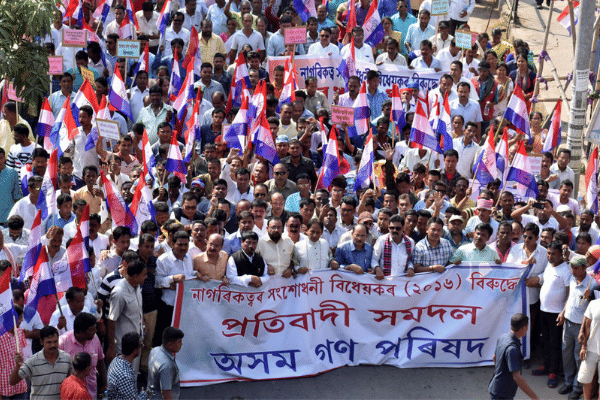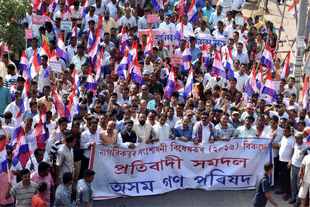Politics
BJP’s Silence Over Citizenship Bill Pushing Assam Towards Grave Crisis
Jaideep Mazumdar
Nov 21, 2018, 11:15 AM | Updated 11:15 AM IST
Save & read from anywhere!
Bookmark stories for easy access on any device or the Swarajya app.


The Citizenship (Amendment) Bill, 2016, which seeks to provide Indian citizenship to Hindus, Sikhs, Buddhists, Jains, Parsis, and Christians fleeing persecution from Afghanistan, Pakistan, and Bangladesh, has been evoking howls of protests in Assam for more than a year now. The Assamese rightly feel that they will become a minority in their own state, one that has been flooded by illegal migrants – mostly Muslim but also a large number of Hindus – from Bangladesh, if the lakhs of Bengali Hindus who entered the state illegally are granted Indian citizenship.
While it would have been advisable for the Bharatiya Janata Party (BJP)-led Union government to announce that the bill, when enacted, will not be applicable to Assam and the other states of the North East, New Delhi’s failure to do so has pushed the state in the throes of a grave crisis. The growing desperation of the Assamese has manifested itself in some, among the bright and educated youngsters of the community, joining the ranks of the proscribed United Liberation Front of Asom (ULFA), which has been waging an armed militancy for the sovereignty of the state.
The latest to join the ranks of the militant outfits, whose chief Paresh Barua has been variously reported to be hiding in Myanmar and China, is Barua’s own nephew, Munna Barua. Munna, who topped his diploma course in electrical engineering and was working as an apprentice junior engineer at an Indian Oil Corporation installation in Digboi (upper Assam) since December last year, joined the ULFA last week along with one Abhijit Gogoi, a Bengaluru-based computer engineer who had worked in the United States (US). Both Munna and Abhijit were meritorious and had a bright future to look forward to. Abhijit hailed from Dibrugarh in upper Assam.
Last week, it came to light that a promising kick-boxer, Karishma Mech, from Tinsukia district (in upper Assam) had joined the ULFA in early May this year. Karishma, a Class X student, was to have travelled to Kathmandu in mid-May for an international kickboxing championship, where she was expected to perform well. Her coaches say that she was immensely talented and was destined to become a national champion. She was also very good in class.
In early October, a senior office-bearer of the Dergaon (in Golaghat district of Upper Assam) regional committee of the All Assam Students' Union (AASU), Pankaj Pratim Dutta, also joined the ULFA. Pankaj, also a bright student with a promising future, had been vehemently opposed to the Citizenship (Amendment) Bill and organising agitations against it. A YouTube video clip of the young man explaining why he joined the ULFA went viral last month and, say the state police, may have motivated many other young men and women to contemplate and plan to follow in his footsteps.
A few days ago, Assam Police’s Special Director General in charge of the force’s Special Branch, Pallab Bhattacharya, admitted that the widespread opposition to the Citizenship (Amendment) Bill has “given a fresh lease of life to the ULFA”. Assam has been witnessing a series of agitations since the bill was introduced in the Lok Sabha in mid-2016. While the agitations against the bill have been gaining momentum, what has added to the growing frustration of the Assamese and heightened the community’s fears of being swamped by illegal migrants from Bangladesh and losing their distinct identity and culture is the BJP-led state government’s silence on the bill. While neighbouring states like Meghalaya, Mizoram, Nagaland and Arunachal Pradesh have passed resolutions in their respective state assemblies opposing the bill, the Assam government has been deafeningly silent on this matter.
Besides the opposition Congress, the Asom Gana Parishad (AGP), a partner in the ruling coalition in the state, has also been opposing the bill and vowed to quit the coalition if the bill is enacted. The AASU led a six-year-long movement from 1979 against the presence of millions of illegal migrants from Bangladesh in the state. The movement ended with the signing of the Assam Accord, under which all those who entered the state illegally from 25 March 1971 were to be detected and deported. But the process of detection and deportation of the illegal Bangladeshi immigrants (IBIs) – the Union government estimates that there are 2 crore IBIs in India, most of them concentrated in Assam and Bengal – has been extremely tardy, thus causing acute disquiet among the estimated 1.8 crore indigenous people of the state.
The widespread feeling, and fear, in Assam is that the Citizenship (Amendment) Bill will negate the Assam Accord. “As per the accord, all those who came to Assam since March 25, 1971, are to be detected and deported. But under this new bill, all Hindus who have entered Assam illegally from Bangladesh till six years ago will be granted Indian citizenship. That means, all the Hindus who have entered Assam till 2012 (assuming that the bill is enacted in the winter session of the Parliament) will become citizens of the country. If these Bengali Hindus are granted citizenship, the Assamese will be reduced to a minority in Assam,” said AASU chief adviser Samujjal Bhattacharya.
The AASU is once again in the forefront of protests against the bill. As many as 28 ethnic communities in the state have been taking out torchlight processions in all districts of the state against the bill. Last weekend, 70 mass organisations of the state organised a mammoth protest against the bill. This bill was referred to a Joint Parliamentary Committee (JPC), which held consultations with civil society leaders, organisations, political parties, bureaucrats, lawyers, and professionals from many parts of the country. Many organisations from Assam submitted strong representations against the bill. It was widely expected that after gauging the public mood against the bill, the Union government would announce that Assam (and the entire North East) would be kept out of the purview of the bill, when enacted. But that has not happened, and the Assamese are angry, apprehensive, and increasingly feeling desperate.
“The process of updating the National Register of Citizens (NRC) is on in the state, and this process is based on the provisions of the Assam Accord. But the bill, when enacted, will nullify the entire NRC update process by granting citizenship to all Hindus from Bangladesh who came to our state after the cut-off date (24 March 1971). This is what is causing intense anger and frustration among the people of the state,” said AGP leader and former chief minister Prafulla Kumar Mahanta. The Union government’s “strange silence” on this issue has intensified the anger and frustration, he added.
“The indigenous people of the state have been repeatedly let down by successive governments in Delhi. Why should Assam have to bear the burden of sheltering millions of illegal migrants from Bangladesh? Why should the Assamese, and other ethnic communities in the state, allow themselves to become hopeless and hapless minorities in their own lands? To us, it does not matter whether an illegal migrant is a Hindu or Muslim. An illegal migrant is an illegal migrant, irrespective of his or her religion, and has no place in Assam. That was what the BJP promised us before coming to power. That was what (Prime Minister) Modi promised the indigenous people of the state when he campaigned in Assam before the 2014 Lok Sabha polls. What has happened to those promises? We, the Assamese, don’t want to become a minority in our own state, and that is the bottom line,” said AASU president Dipanka Kumar Nath.
Nath’s sentiments find wide and unanimous resonance across Assam. “The Assamese are feeling terribly let down by the BJP at the Centre and in the state. The BJP came to power both in Delhi and Dispur (Assam’s capital complex) on the promise of deporting illegal Bangladeshi immigrants. That time, it made no distinction between Hindu and Muslim immigrants. If the BJP is so keen on granting citizenship to illegal Hindu immigrants from Bangladesh, let it offer them (the Hindu Bengalis) refuge in states outside the North East. But it is not doing so and has been completely silent on this burning issue. This silence is what gives the impression that the BJP is determined to pass the bill, which will be introduced in the ensuing winter session of Parliament,” said a retired director general of police who wished to remain anonymous.
There have been alarming intelligence reports of educated youth in the state expressing their intent to or planning to join the ULFA. “The young people are frustrated at the stand of the BJP government and feel that launching an armed struggle once again is the only way to ensure the preservation of the identity of Assam and the Assamese. Just look at social media posts and reactions to news on the bill and youngsters joining the ULFA. All posts are supportive of the ULFA, condemn the Union and state governments, and some even openly advocate armed struggle. This is extremely alarming, and we are once again moving to a pre-1979 (the launch of the protracted Assam movement) stage that gave birth to the ULFA,”said a serving police officer.
Everyone agrees that the situation in the state is grave and heading towards a crisis, one that can well be avoided, and one that will erode the BJP’s popularity and credibility in Assam.





